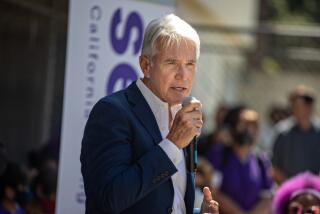Hearings Reveal FBI Had Doubts Lee Was China Spy
- Share via
WASHINGTON — Two months before Wen Ho Lee was fired in March 1999 and identified by U.S. officials as the prime suspect in an espionage case at Los Alamos National Laboratory, FBI investigators in New Mexico told headquarters they doubted Lee was the spy they were looking for.
But FBI officials in Washington did not acknowledge these and other doubts about Lee as the source of leaked W-88 warhead secrets to China until FBI Director Louis J. Freeh told Congress in mid-September that the bureau was widening its espionage probe to include other potential suspects at additional weapon facilities.
New information about the FBI’s initial investigation of Lee has emerged as Sen. Arlen Specter (R-Pa.) begins three days of hearings today on legislation designed to rectify the kind of “very serious mistakes” he attributed to the Justice Department in its failure to approve a secret search warrant in the Lee case.
Specter on Monday dismissed doubts expressed about Lee’s culpability by the FBI’s Albuquerque field office in a Jan. 22 memorandum. He said FBI investigators were “thrown off” course in early 1999 after they were informed by the Department of Energy that Lee had passed a polygraph examination in December 1998. Subsequent FBI reviews, Specter maintains, show he failed.
But Lee’s lawyer, Mark Holscher, said greater candor on the FBI’s part could have substantially changed the public’s understanding of the case and mitigated the widely held belief that his client was possibly one of the most damaging spies of the century.
“We’re concerned that this information was not given to the Senate during its review of this matter last year--and has yet to be provided to us,” Holscher said Monday in an interview. Holscher also disputed Specter’s contention that Lee failed the DOE polygraph, saying three DOE polygraphers had given Lee high passing scores.
Lee is now in solitary confinement awaiting trial and facing the possibility of life imprisonment on 59 felony counts for downloading nuclear secrets to unsecured computers. The case grew out of--but is unrelated to--the earlier espionage probe, in which prosecutors now concede they have no evidence that Lee passed warhead secrets to China.
More to Read
Sign up for Essential California
The most important California stories and recommendations in your inbox every morning.
You may occasionally receive promotional content from the Los Angeles Times.










